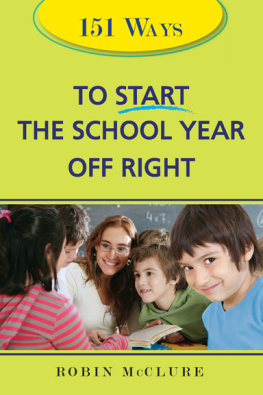About the Authors
Gregory P. Hickman, Ph.D., moved to Arizona in 2004 to become the director of the Arizona Dropout Initiative. His research has primarily focused on adolescent problem behaviors. More specifically, how does parenting impact such adolescent behavior? In addition, his research has focused on programmatic evaluation including evaluating adolescent programs for Procter & Gamble, Maricopa Community Colleges. He lives with his wife Tammy, two boys Alex and Zach, and three labs (Woody, Cooper, and Earleyes, all named after Ohio State football coaches).
Randy S. Heinrich, D.M., served for over a decade as an educator in a rural Arizona school district, with research interests in dropout prevention and alternative schools. While he currently serves as faculty for Argosy University Online, Randy, his bride Donna, and their dogs reside in the beautiful White Mountains of Arizona.
Acknowledgments
We would like to express our sincere gratitude to Doctors Lattie Coor and Sybil Francis of the Center for the Future of Arizona (CFA). The study that offers the basis for this book was first conceptualized while the author Greg Hickman was the director of the Arizona Dropout Initiative at CFA. Without their gracious support and vision, this study would not have been feasible. We also would like to express our deep appreciation to Dr. Carol Peck of the Rodel Charitable Foundation. The author Greg Hickman, as director of the Rodel Community Scholars, was able to continue this study with co-author Randy Heinrich, as director of special services, Round Valley Schools (RVS), with support from the Rodel Charitable Foundation.
In addition, we thank Travis Udall, superintendent, and the wonderful staff at RVS for giving us access to student records to conduct this landmark study, and furnishing the lived experiences that deeply informed and inspired our view of school and community life in practical and potential terms for students and their families. We thank the Apache County Juvenile Probation Department for granting us access to their records to complement our findings. We thank Mitchell Bartholomew and Jennifer Mathwig for their efforts in writing the original publication of this study. We are indebted to Linda Swain for her editing support to improve the readability of our book and Dwight Getting for his patient, extensive help with producing the artwork. We deeply value the insights from a host of readers who took the time to review our draft book, including Karalea Cox, Susan Myers, Greg and Kathy Stopka, Amy Levinton, Travis Udall, Eleanor Pierce, Dr. Vanessa Girard, Dr. Marilyn Simon, Dr. Christine Ybarra, Bert Honigman, Scott Poch, and Justin DeMello. Finally, we would like to thank our families, especially our wives Tammy and Donna, for their enduring support to our commitment to this very important endeavor.
Chapter 1
The Usual Suspects
What Do We Know Regarding Why Children
Drop Out of School?
The short answer to the question posed in the title of this book, Do Children Drop Out of School in Kindergarten?, is yes. When we peg youth as problem children, carefully note their academic and social issues, count the numbers of mounting absences, offer remediation repeatedly (often at the expense of what may make learning joyful), and lower expectations about potential, should we be surprised that our children develop a sense of failure, low self-efficacy, disenfranchisement, and a desire to give up and drop out?
Currently, research regarding high school dropouts has centered on the identification and intervention of at-risk students with a propensity to drop out of school. Educational and community leaders, as well as policymakers, have incorporated available research and crafted numerous intervention programs and strategies targeted toward this audience. Unfortunately, many of these efforts have failed to demonstrate effectivenessdropout rates across schools, districts, and states have remained the same.
The inability of educators, researchers, and program designers to effectively reduce the number of students dropping out of school may be grounded in their approach to understanding dropouts. More specifically, the driving force of research and dropout intervention programs has been tailored toward secondary education. Such a practice assumes an educational vacuum in a students life from kindergarten to 8th grade. By ignoring the early years, educators and researchers may be overlooking the human ecology of students prior to the start of high school. In reality, adolescents experience many factors outside the education system that influence their development. Research regarding high school dropouts tends to use designs aimed at understanding linear relationships between specific variables, comparing variables that identify differences between dropouts and graduates, and predicting which variables are related to dropouts. Such cause-and-effect thinking does not address the complexities that arise in the lives of youth in school, family, and community systems. As noted by the National Dropout Prevention Center, one of the greatest challenges in educational research is documenting long-term outcomes of early childhood educational experiences, a critical portion of the education system.
So the question we must ask is why educators and researchers continue to focus their efforts at the secondary level of education regarding high school dropouts when it seems inherent that the genesis of academic failure appears earlier in the students educational development. In other words, evidence suggests student academic outcomes in high school are built upon the educational foundations developed prior to high school and are, furthermore, affected by education, family, and community systems. Still, there are indicators, or the usual suspects, that drive dropout prevention efforts.
THE USUAL SUSPECTS
Academic Suspects
Educators have established that the childs shift from home life to school is an important transition. Making a successful shift from being at home to school is crucial in helping the child create an academic identity. Schools tend to operate in self-centered ways, doing business as if everyone lives on a bell schedule. Even as the child possesses different capabilities resulting from genetics, school, community, and home life, the American schooling process typically relies on traditional Socratic and eighteenth-century hierarchical models using mechanized processes with many prepackaged developmental expectations and interventionsuseful for sorting types of students but with long-term implications for subsequent student self-regard.
Indicators that a student will eventually drop out of high school tend to appear within the first year of a childs schooling. The question becomes, when does the pathway between graduates and dropouts begin to look markedly different? Given the dissimilar experiences children encounter during their first five years of life, it is probable that not all children enter kindergarten with the developmental strengths required for subsequent academic success. The reading level at 3rd grade has been found across various studies to be a strong predictor of students who drop out of high school. Hence, 3rd grade has received notable attention as a possible critical period for increasing the chances of schooling success. It is thought that if actions are not taken by 3rd grade to correct academic deficits, particularly literacy preparation, those students who struggle will start on a downward academic spiral that may eventually lead to dropping out of school.
Perhaps the struggling students noticeable literacy deficits in 3rd grade are a result of missing school. Research clearly demonstrates that attendance in kindergarten is highly predictive of attendance at higher levels of education. For example, a recent study of absenteeism found that dropouts averaged 16 days of absenteeism in kindergarten compared to 10 days of absenteeism for graduates. This six-day difference in absenteeism increased the likelihood of dropping out by 30%. Indeed, absenteeism in kindergarten has been linked to students future academic attachment, identity, and success orientation.









